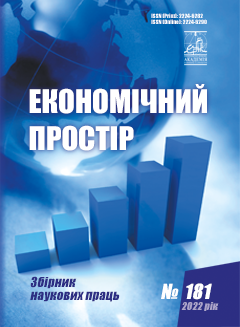DEVELOPMENT TRENDS OF THE DIGITAL ECONOMY AS AN ECONOMIC SYSTEM
Abstract
The digital economy is interpreted as the result of the transformational effects of new technologies of general purpose in the field of communication and information, which affect all sectors of the economy and social activity. Attention to the digital economy is due to the fact that information technologies are gaining more and more importance in the economic development of all countries of the world. The use of digital technologies for the sale of goods and services, the provision of public services, and the education of citizens will allow the entire society to acquire the so-called digital dividends, which are understood to mean the growth of national well-being and material profit. The digital economy is perceived as an economic activity, where the key factor is data in digital form, the processing of large volumes and the use of results by traditional forms of business, the efficiency of various types of production, technologies, equipment, storage, sale, delivery of goods and services. For full interaction, all subjects and objects of the economy must acquire a significant digital component, due to which its consumer properties and security are significantly improved, accounting for more than half of its cost. Over time, a significant part of the cost of most goods and services will be determined by this component. Such products are designed to significantly improve their main properties or contribute to the emergence of new ones. It is noted that the digital economy is a component of the information (digital) environment, which is formed in accordance with the needs of the real sector of the economy and the demands of society, which change under the influence of technological innovations. The digital economy is an independent phenomenon, it is isolated from other concepts of the modern global economy, inseparably related to certain areas of ICT development. Today's global digital economy directly affects economic growth. The institutional structure of the digital economy consists of institutional subjects, institutional objects and an institutional mechanism. Digital transformation processes are driving forces that stimulate changes in the business environment, the basis of which is the introduction of new technologies, such as big data analysis, the Internet of Things, cloud technologies or 3D printing.
References
Digital economy. URL: http://ec.europa.eu/growth/sectors/digital-economy/index_en.htm (дата звернення: 14.05.2022).
What is Digital Economy? URL: https://www2.deloitte.com/mt/en/pages/technology/articles/mt-what-is-digital-economy.html (дата звернення: 14.05.2022).
Schwab K. The Fourth Industrial Revolution: what it means, how to respond. URL: https://www.weforum.org/agenda/2016/01/the-fourth-industrial-revolution-what-it-means-and-how-to-respond/ (дата звернення: 14.05.2022).
Fayyaz S. A review on measuring digital trade & e-commerce as new economic statistics products. The 16th Conference of IAOS. 2018. URL: https://www.semanticscholar.org/paper/A-Review-onMeasuring-Digital-Trade-%26-E-Commerce-asFayyaz/12dd8ff767524093c7faf58960699cfc62e7c6e4 (дата звернення: 14.05.2022).
Europe 2020. A European Strategy for Smart, Sustainable and Inclusive Growth. URL: https://ec.europa.eu/eu2020/pdf/COMPLETENBARROSO%20%20007-Europe2020–ENversion.pdf (дата звернення: 14.05.2022).
EU's new Digital Strategy for the next five years – will Europe become a trusted digital player. URL: https://www.whitecase.com/publications/alert/eus-newdigital-strategy-next-five-years-will-europe-become-trusted-digital (дата звернення: 14.05.20222).
White Paper On Artificial Intelligence – A European Approach to Excellence and Trust. Brussels. 19.02.2020 COM (2020) 65 final. URL: https://ec.europa.eu/info/sites/info/files/commission-white-paper-artificialintelligence-feb2020_en.pdf (дата звернення: 14.05.2022).
Shaping Europe's Digital Future. Brussels. 19.02.2020 COM(2020) 65 final. URL: https://ec.europa.eu/commission/presscorner/detail/en/fs_20_278 (дата звернення: 14.05.2022).
Цифрова адженда України – 2020 («Цифровий порядок денний» – 2020). URL: https://ucci.org.ua/uploads/files/58e78ee3c3922.pdf (дата звернення: 14.05.2022).
Державна служба статистики України: офіційний сайт. URL: http://www.ukrstat.gov.ua/ (дата звернення: 14.05.2022)
Mesenbourg T.L. Measuring the Digital Economy. U.S. Bureau of the Census, 2001.
Digital economy. Available at: http://ec.europa.eu/growth/sectors/digital-economy/index_en.htm (accessed 14 May 2022).
What is Digital Economy? Available at: https://www2.deloitte.com/mt/en/pages/technology/articles/mt-what-is-digital-economy.html (accessed 14 May 2022).
Schwab K. The Fourth Industrial Revolution: what it means, how to respond. Available at: https://www.weforum.org/agenda/2016/01/the-fourth-industrial-revolution-what-it-means-and-how-to-respond/ (accessed 14 May 2022).
Fayyaz S. A review on measuring digital trade & e-commerce as new economic statistics products. The 16th Conference of IAOS. 2018. Available at: https://www.semanticscholar.org/paper/A-Review-onMeasuring-Digital-Trade-%26-E-Commerce-asFayyaz/12dd8ff767524093c7faf58960699cfc62e7c6e4 (accessed 14 May 2022).
Europe 2020. A European Strategy for Smart, Sustainable and Inclusive Growth. Available at: https://ec.europa.eu/eu2020/pdf/COMPLET EN BARROSO%20%20 007 – Europe 2020 – EN version.pdf (accessed 14 May 2022).
EU's new Digital Strategy for the next five years – will Europe become a trusted digital player. Available at: https://www.whitecase.com/publications/alert/eus-newdigital-strategy-next-five-years-will-europe-become-trusted-digital (accessed 14 May 2022).
White Paper On Artificial Intelligence – A European Approach to Excellence and Trust. Brussels. 19.02.2020 COM (2020) 65 final. Available at: https://ec.europa.eu/info/sites/info/files/commission-white-paper-artificialintelligence-feb2020_en.pdf (accessed 14 May 2022).
Shaping Europe's Digital Future. Brussels. 19.02.2020 COM(2020) 65 final. Available at: https://ec.europa.eu/commission/presscorner/detail/en/fs_20_278 (accessed 14 May 2022).
Tsyfrova adzhenda Ukrainy – 2020 («Tsyfrovyi poriadok dennyi» – 2020) [Digital Agenda of Ukraine – 2020 («Digital Agenda» – 2020)]. Available at: https://ucci.org.ua/uploads/files/58e78ee3c3922.pdf (accessed 14 May 2022).
Derzhavna sluzhba statystyky Ukrainy: ofitsiinyi sait [State Statistics Service of Ukraine: official website]. Available at: http://www.ukrstat.gov.ua/ (accessed 14 May 2022).
Mesenbourg T.L. (2001) Measuring the Digital Economy. U.S. Bureau of the Census (in English).



